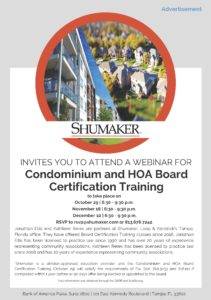 On March 27, 2020, Florida’s Department of Business and Professional Regulation (“DBPR”) issued Emergency Order 2020-04 in response to the severe outbreak of the Novel Coronavirus Disease 2019 (“COVID-19”).
On March 27, 2020, Florida’s Department of Business and Professional Regulation (“DBPR”) issued Emergency Order 2020-04 in response to the severe outbreak of the Novel Coronavirus Disease 2019 (“COVID-19”).
This Emergency Order suspends one of the preconditions on an association’s use of statutory emergency powers upon a “response to damage caused by an event,” which qualifying language is contained in Sections 718.1265(1), 719.128(1) and 720.316(1), Florida Statutes, of the Condominium Act, Cooperative Act, and Homeowners’ Association Act, respectively. This qualifying language raised some concern among Florida communities of the applicability of the association’s emergency powers in response to damages caused by infectious diseases in lieu of damages more commonly associated with hurricanes, floods, or other natural disasters. The Emergency Order affirmatively authorizes the use of an association’s emergency powers under Sections 718.1265(1)(a)-(j), 719.128(1)(a)-(j) and 720.316(1)(a)-(h), Florida Statutes, to protect the health, safety, and welfare of the association, owners, family members, tenants, guests, agents, or invitees. Section 718.1265(1)(a)-(j), and the substantially similar language in Chapters 719 and 720, provides the association with the following emergency powers: Continue reading “DBPR Emergency Order 2020-04 Suspending Damage Requirement For Condominium Association Emergency Powers”
 Join us from the comfort of your own home for the Condominium and HOA Board of Directors Training Course. Shumaker is a division-approved education provider and this class will satisfy the requirements of Fla. Stat. §§ 720.3033 and 718.112 if completed within 1 year before or 90 days after being elected or appointed to the board.
Join us from the comfort of your own home for the Condominium and HOA Board of Directors Training Course. Shumaker is a division-approved education provider and this class will satisfy the requirements of Fla. Stat. §§ 720.3033 and 718.112 if completed within 1 year before or 90 days after being elected or appointed to the board.

 In a recent case, Kelly v. Duggan, 282 So.3d 969 (Fla. 1st D.C.A. 2019), out of Florida’s First District Court of Appeals looked at whether condominium association assessments qualify as “consumer debts” under the Florida Consumer Collection Practices Act (FCCPA). The FCCPA, Florida Statutes §559.55 et seq. (“FCCPA”) and its federal counterpart, Federal Fair Debt Collection Practices Act, 15 U.S.C. §1692 et seq. (“FDCPA”) protect consumers from unfair and deceptive debt collection activities and regulate consumer debt collection in Florida. Like the FDCPA, the FCCPA prohibits creditors and debt collectors from engaging in fraudulent, abusive, and harassing tactics in collecting debts for the State of Florida.
In a recent case, Kelly v. Duggan, 282 So.3d 969 (Fla. 1st D.C.A. 2019), out of Florida’s First District Court of Appeals looked at whether condominium association assessments qualify as “consumer debts” under the Florida Consumer Collection Practices Act (FCCPA). The FCCPA, Florida Statutes §559.55 et seq. (“FCCPA”) and its federal counterpart, Federal Fair Debt Collection Practices Act, 15 U.S.C. §1692 et seq. (“FDCPA”) protect consumers from unfair and deceptive debt collection activities and regulate consumer debt collection in Florida. Like the FDCPA, the FCCPA prohibits creditors and debt collectors from engaging in fraudulent, abusive, and harassing tactics in collecting debts for the State of Florida.





